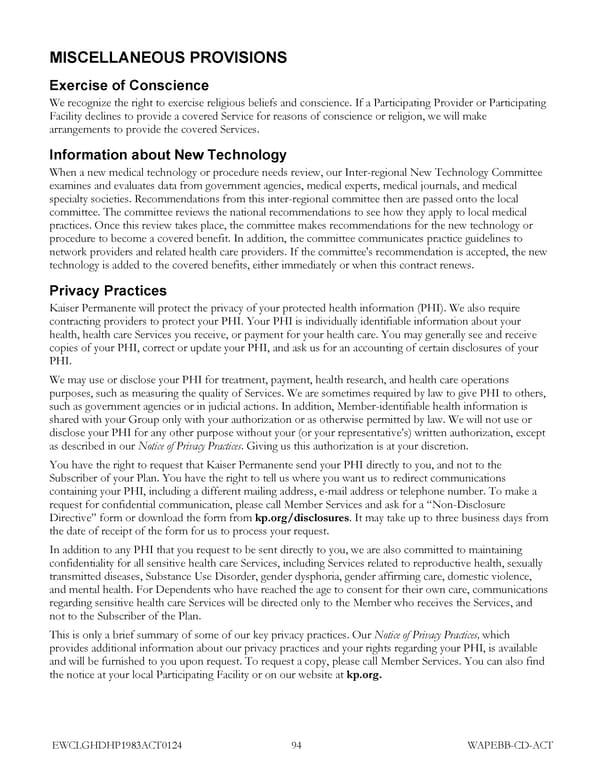MISCELLANEOUS PROVISIONS Exercise of Conscience We recognize the right to exercise religious beliefs and conscience. If a Participating Provider or Participating Facility declines to provide a covered Service for reasons of conscience or religion, we will make arrangements to provide the covered Services. Information about New Technology When a new medical technology or procedure needs review, our Inter-regional New Technology Committee examines and evaluates data from government agencies, medical experts, medical journals, and medical specialty societies. Recommendations from this inter-regional committee then are passed onto the local committee. The committee reviews the national recommendations to see how they apply to local medical practices. Once this review takes place, the committee makes recommendations for the new technology or procedure to become a covered benefit. In addition, the committee communicates practice guidelines to network providers and related health care providers. If the committee's recommendation is accepted, the new technology is added to the covered benefits, either immediately or when this contract renews. Privacy Practices Kaiser Permanente will protect the privacy of your protected health information (PHI). We also require contracting providers to protect your PHI. Your PHI is individually identifiable information about your health, health care Services you receive, or payment for your health care. You may generally see and receive copies of your PHI, correct or update your PHI, and ask us for an accounting of certain disclosures of your PHI. We may use or disclose your PHI for treatment, payment, health research, and health care operations purposes, such as measuring the quality of Services. We are sometimes required by law to give PHI to others, such as government agencies or in judicial actions. In addition, Member-identifiable health information is shared with your Group only with your authorization or as otherwise permitted by law. We will not use or disclose your PHI for any other purpose without your (or your representative’s) written authorization, except as described in our Notice of Privacy Practices. Giving us this authorization is at your discretion. You have the right to request that Kaiser Permanente send your PHI directly to you, and not to the Subscriber of your Plan. You have the right to tell us where you want us to redirect communications containing your PHI, including a different mailing address, e-mail address or telephone number. To make a request for confidential communication, please call Member Services and ask for a “Non-Disclosure Directive” form or download the form from kp.org/disclosures. It may take up to three business days from the date of receipt of the form for us to process your request. In addition to any PHI that you request to be sent directly to you, we are also committed to maintaining confidentiality for all sensitive health care Services, including Services related to reproductive health, sexually transmitted diseases, Substance Use Disorder, gender dysphoria, gender affirming care, domestic violence, and mental health. For Dependents who have reached the age to consent for their own care, communications regarding sensitive health care Services will be directed only to the Member who receives the Services, and not to the Subscriber of the Plan. This is only a brief summary of some of our key privacy practices. Our Notice of Privacy Practices, which provides additional information about our privacy practices and your rights regarding your PHI, is available and will be furnished to you upon request. To request a copy, please call Member Services. You can also find the notice at your local Participating Facility or on our website at kp.org. EWCLGHDHP1983ACT0124 94 WAPEBB-CD-ACT
 Kaiser Permanente NW CDHP EOC (2024) Page 100 Page 102
Kaiser Permanente NW CDHP EOC (2024) Page 100 Page 102